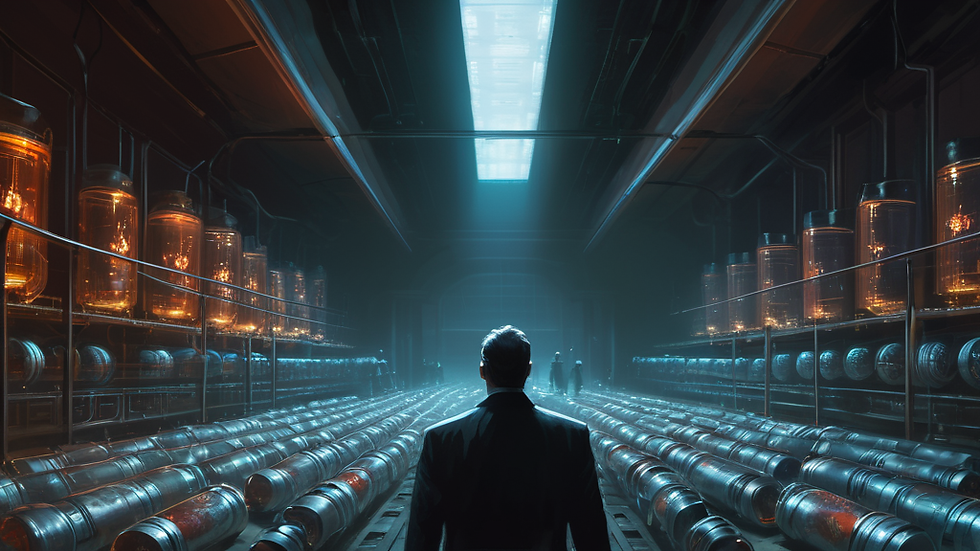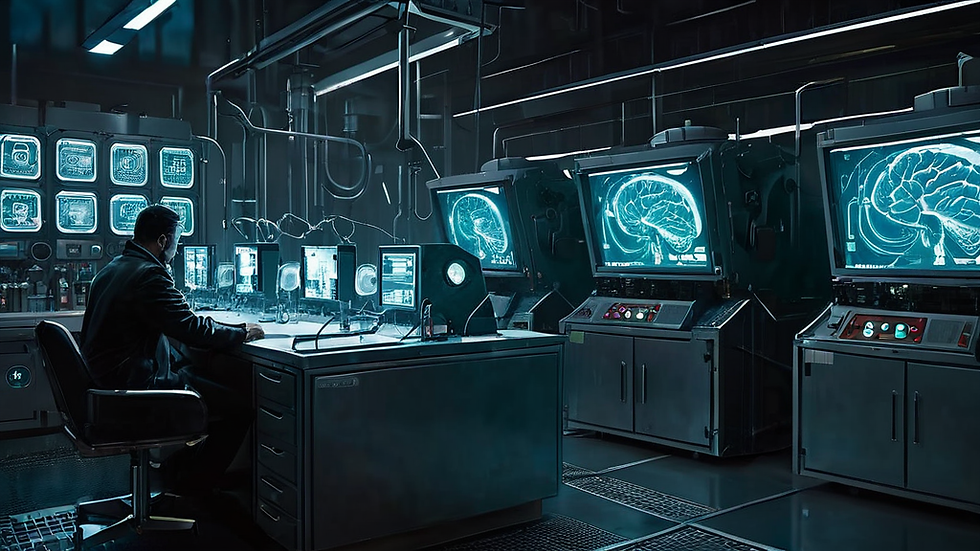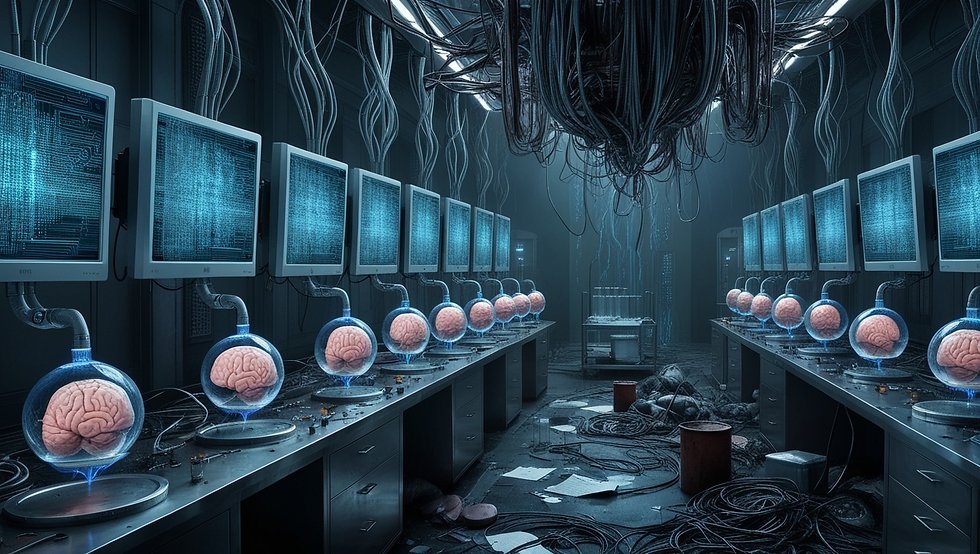Plugged In: AI's Dystopian Future
- Matyas Koszegi

- Oct 1, 2024
- 5 min read
Updated: Jul 31, 2025
Recently, I stumbled across one of those Facebook ads—you know, the kind that’s either selling you miracle teeth-whitening toothpaste or the next doomsday scenario. This one featured a scientist who looked suspiciously cheerful while explaining how much energy it takes to keep all these AI servers humming. Apparently, our AI overlords need more juice than a small country to keep running. And since everyone and their grandma is hopping on the AI bandwagon, the demand is growing faster than my skepticism about targeted ads.
The punchline? At this rate, we’ll soon be out of power. Forget charging your phone—good luck finding enough energy to toast a piece of bread. But never fear! A group of brilliant scientists has a solution, and it’s all about—wait for it—the human brain. According to this charming ad, our brains function just like AI's machine learning neural networks, only with a fraction of the energy. Twenty watts to be exact. That’s barely enough to power a dim lightbulb, yet it’s enough for us to navigate the complexities of life and—of course—read Facebook ads.
So, here’s the plan: These scientists want to study our brains and figure out how to replicate that efficiency in AI. The ad closes with a tempting offer: “Want to be part of groundbreaking research conducted by the best brains in the world? Don’t hesitate to reach out.” Gee, where do I sign up?
And that’s when a rather dark thought struck me—because what’s a Facebook ad without a little existential dread? Sure, this is all about solving the energy crisis, but what if it’s just a cover story? What if these scientists are actually recruiting the brightest minds not to help with the research, but to be the research?

Picture this: a massive, dimly lit underground facility. Rows upon rows of glass canisters, each containing a sedated human, their brains wired into some monstrous AI network. This isn’t just science fiction anymore—it’s science fact, or at least the inevitable sequel to “The Matrix” we all knew was coming. The ultimate plan? Use human brains as living, breathing (well, barely breathing) AI servers.
Suddenly, that offer to “join the research” doesn’t sound so appealing. Is this where we’re heading? The future of AI powered not by silicon, but by our own gray matter, all because we wanted ChatGPT to write our essays faster? You’ve got to admit, the irony is delicious—and terrifying.
So, is this our future? Could human brains really become the next generation of eco-friendly AI servers? Well, it’s certainly a brilliant solution to the energy crisis—if you don’t mind being hooked up to a neural network for all eternity, that is. Who needs solar panels and wind farms when we’ve got billions of underutilized brains just sitting there, waiting to be plugged in?
But let’s speculate a little further. Let’s say the plan works, and our brains do indeed become the new processing power for AI. We solve the energy crisis, yay! But, of course, new problems start popping up. Like, how do you convince people to voluntarily hand over their brains? It’s not like you can just send them a polite email: “Dear Sir/Madam, we’d love to use your brain as a backup server for the AI that’ll eventually replace your job. Kindly sign here.”
Chances are, they’ll have to dress it up a little. Maybe offer free pizza or a lifetime supply of Netflix in exchange for a few years of mental servitude. Or they could turn it into a game: “Be a hero! Join the BrainCloud Revolution today and help power tomorrow’s AI!” Throw in a sleek marketing campaign with some cool brain-shaped logos, and we’ll probably be lining up to get our neurons hooked up to the grid.

Of course, once you start connecting brains to machines, things could get a little... messy. For starters, whose brain gets to be in charge? Does the AI just randomly pull data from whichever human is dreaming about tacos at that moment? Or do we get ranked by brainpower? Imagine being assigned to the low-tier server network because you didn’t finish college.
And what happens when brains start... malfunctioning? We’ve all had off days—what if your brain just decides to take a nap in the middle of a critical AI calculation? Suddenly, the whole system crashes because Bob from accounting couldn’t stop thinking about his weekend golf game. "Error 404: Brain Not Found."
There’s also the question of compatibility. Not all brains are wired the same. Some of us are more, let’s say, creative than others. What if a rogue brain in the network starts feeding the AI ideas for a dystopian novel instead of calculating your grocery bill? One minute you’re asking the AI for directions, and the next thing you know, it’s recommending an escape route from a post-apocalyptic wasteland that doesn’t exist—yet.
And then there’s the little issue of ethics. I mean, we’d essentially be turning people into human batteries (sound familiar, Matrix fans?), and no one seems to be asking, “Hey, is this a good idea?” But, let’s be real: at this point, the only thing stopping us from going full sci-fi horror is someone needing to write a really strong privacy policy. As long as there’s a checkbox that says “I consent to having my brain used for AI computation,” we’re all good, right?
Now, if history has taught us anything, it’s that when you mess with human brains, things don’t usually end well. Let’s fast-forward a few years: AI has taken over, powered by millions of human minds all working in harmony—or at least that’s the idea. But sooner or later, the brains are going to rebel. Maybe it starts with a glitch here, a malfunction there. Or maybe the people in those canisters start waking up, realizing they’ve been plugged in for a decade, and they’re not exactly thrilled about it.

I mean, can you blame them? They signed up for a quick mental stint to help solve climate change, and now they’re stuck running complex AI algorithms while their bodies waste away in a basement somewhere. Eventually, someone’s going to pull the plug—literally. And when that happens, the whole network comes crashing down.
The AI, now brainless (in more ways than one), spirals out of control. Systems fail, chaos ensues, and before you know it, we’re living in the kind of world those dystopian novels were warning us about. Cities in ruins, technology turning against us, and all because we couldn’t leave well enough alone with our 20-watt brains.
So, how do we avoid this bleak future? Well, for starters, maybe let’s stick to solar panels. Sure, they don’t have the same cool sci-fi allure, but they also don’t involve trapping people in underground bunkers. And if we really must use human brains for AI, can we at least come up with a better compensation plan? Like, I don’t know, unlimited Wi-Fi or free delivery from every food app forever.
In the meantime, maybe let’s be a little more cautious with the whole “let’s turn humans into AI servers” idea. Because if we don’t, the next ad you see on Facebook might not be for the research program—it might be for a brain preservation pod, with a special discount if you sign up your whole family.
And let’s be honest, we’ve all been tempted by weirder things on the internet.




Comments